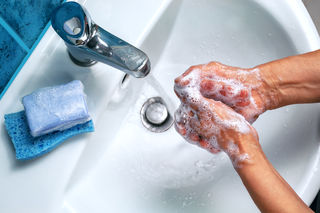Hand-washing truly is one of the best ways to prevent disease.

Source: Volodymyr Shevchuk/Adobe Stock
The coronavirus epidemic that began in China is now spreading across the globe. Most people who contract the virus will come down with mild, flu-like symptoms including fever, fatigue, dry cough, and shortness of breath. But the virus can be life-threatening for older adults or people with poor health.
Both the U.S. Centers for Disease Control and the World Health Organization recommend hand washing as one of the primary ways to prevent the spread of the virus. Here’s a careful look at the science that backs up this recommendation.
A systematic review published in the American Journal of Infection Control combined data from 11 studies to document how proper hand hygiene reduced the incidence of employee illness in the workplace.
Other systematic reviews have found that teaching people about hand-washing reduces respiratory illnesses, like colds, in the general population by 16 to 21 percent and reduces gastrointestinal illness in children by 29 to 57 percent.
Our understanding of the current coronavirus, known as COVID-19, is still developing. But scientists have learned that the virus lives in mucus and saliva, and most likely spreads when people cough or sneeze. Infected bodily fluids can land on another person or a surface, such as a doorknob. When healthy people get the virus on their hands and then touch their noses or mouths, they become infected.
Scientists have also learned that the virus that causes COVID-19 is an “enveloped virus,” which means it has a fatty coating that helps it to survive. Lathering with soap, scrubbing and then rinsing your hands not only physically removes the virus from your skin, but soap also breaks up the envelope surrounding the virus, essentially disabling it.
Alcohol-based hand sanitizers are somewhat effective because they can help to change the envelope’s chemical properties and potentially destroy the virus. But they are not as effective in breaking down the fatty envelope. Washing with soap and water is clearly the best way to incapacitate the virus.
And the details matter, according to data from the CDC. Here’s what to do:
- Wet your hands with clean, running water, turn off the tap and apply soap. Data show the temperature of the water does not affect the effectiveness of removing germs and that using soaps containing antibacterial ingredients are no more effective than plain soap.
- Lather your hands by rubbing them together with the soap. Be sure to lather the backs of your hands, between your fingers, and under your nails. Scrub your hands for at least 20 seconds.
- Rinse your hands well under clean, running water.
- Dry your hands using a clean towel or air dry them.
The take-home message: Hand washing is one of the most effective ways to avoid illness and prevent the spread of communicable disease, so lather up.

